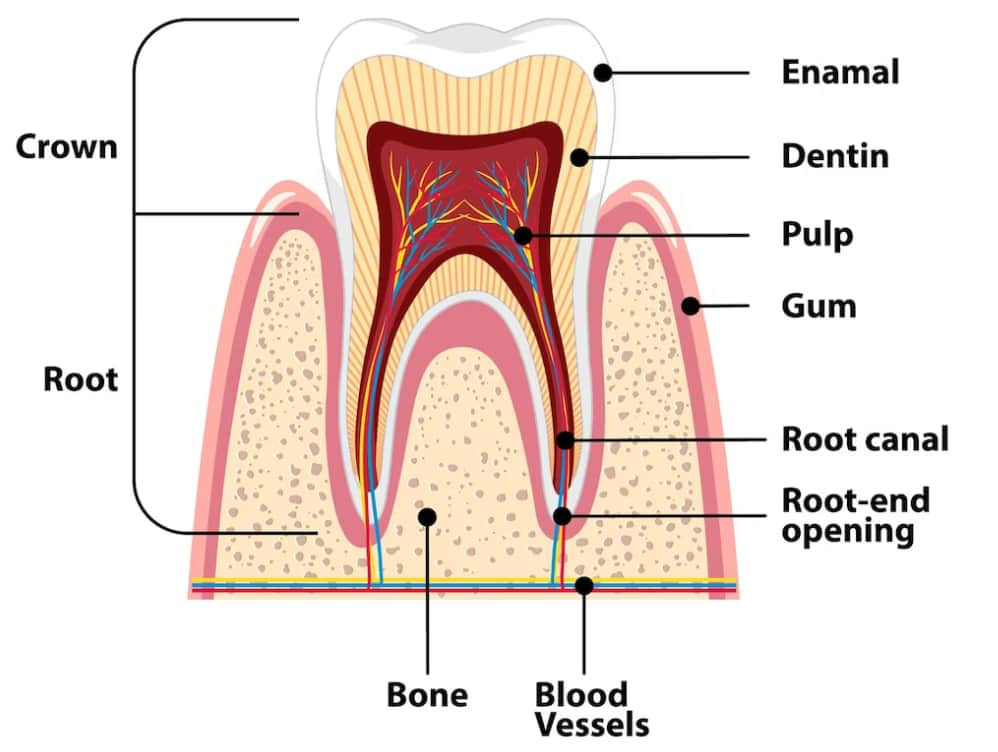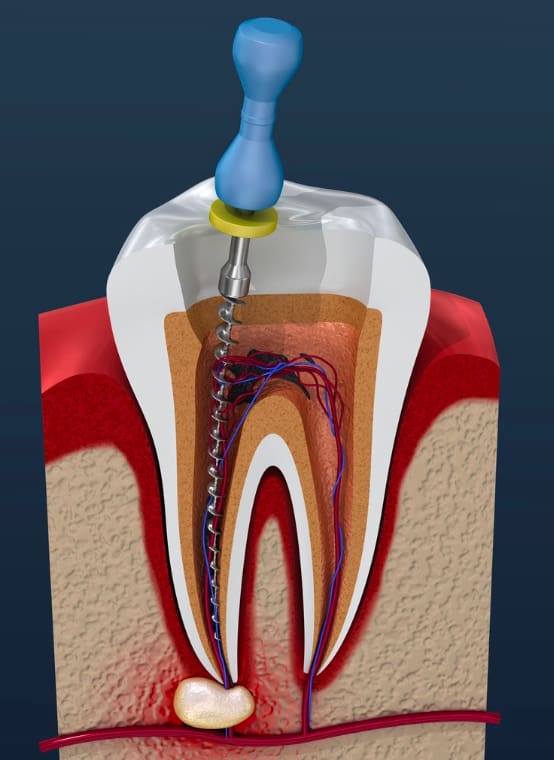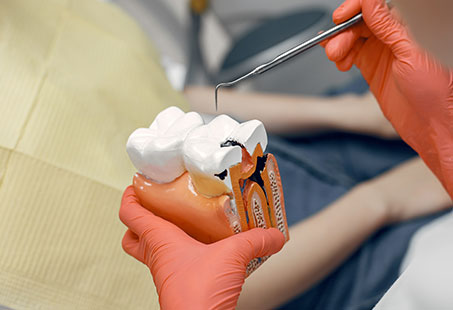A root canal infection occurs when bacteria in the mouth invade the tooth root canals. This can be either primary or secondary.
A primary root canal infection is when bacteria enter the canal system and damage the tooth pulp within.
Conversely, a secondary root canal infection occurs when bacteria are inadvertently introduced into the root canal system by a dental procedure or faulty restorations.
In either case, it’s important to get treatment for a tooth root canal infection because it can cause serious complications, which can also be life-threatening. For that reason, it’s a good idea to know about canal infections.
What Is A Canal Infection?
There are 4 layers of a tooth: enamel, dentin, cementum and pulp (in that order).
The tooth pulp is located at the centre of the tooth within the root canal system. It’s also where the nerves, blood vessels and connective tissues are present.

So, it’s vital to provide nutrition to the tooth and keep it alive. Still, according to the American Association of Endodontists, once the tooth has finished development, survival without the pulp is possible because nutrition can come from surrounding tissue.
Regardless, if there’s a breach in any of the dental structures outside of the pulp, a path is created for the bacteria in the mouth to enter. This causes an infection, and it can happen if the tooth’s been cracked due to a dental cavity or traumatic injury. Additionally, it can occur due to:
- Invasion of dentinal tubules (microscopic channels in the dentin)
- Anachoresis (bacteria in the blood get attracted to inflammation in dental pulp)
- Teeth grinding (bruxism)
- Cracked or broken restorations
Post-surgery causes of root canal infection include:
- Untreated canals that remained hidden because of their shape
- Incomplete cleanliness of the canal
- Delay in the placement of a dental restoration
- Structural weakening or breakdown of the new restoration (filling or crown)
- New cavity or dental trauma
Keep in mind that everyone has microbes in their mouth. And this oral microbiome is actually there to sustain your oral health. Therefore, you can’t just get rid of the microbes in your mouth (it even comes from food).
But it’s important to maintain a balanced microbiome (good hygiene, no smoking, healthy salivary glands, etc.). Because if the balance shifts in favour of the microorganisms that intend to do harm, that can also make your pulp more vulnerable to infection.
How Do You Know If A Root Canal Is Infected?
A root canal infection can cause the following signs and symptoms:
- Pain (pulsating, dull ache, or intermittent)
- Hurts when you bite food or when it is hot or cold
- Sensitivity to hot or cold foods
- Swelling
- Redness
- Tenderness
- Warmth
- Formation of a pimple or boil
- Oozing pus
- Tooth discolouration
- Bad breath
- Bad taste in the mouth
- Loose tooth
With regard to pain after a dental procedure, keep in mind that it should get better with time. If that’s not happening, you should get in touch with your dentist.
How Do You Treat An Infected Root Canal?
The treatment for an infected root canal depends on the severity of the problem. It can be any of the following:
- Root canal (and another one in case of reinfection)
- Endodontic surgery
- Tooth extraction
In a root canal, the dentist will drill into your tooth, clean the canals and fill them with a rubber material called gutta-percha.
However, if you need another root canal treatment, the tooth will be reopened, the filling removed, and the canals recleaned.

The dentist will also look out for an extra canal that may have been left out in the first procedure. After that, another filling is put inside the canals, and the tooth is fitted with a restoration.
Unfortunately, a root canal isn’t always enough, in which case your dentist will recommend endodontic surgery.
It can find any hidden canals that are not visible on the X-rays, remove any calcium deposits in root canals, get rid of infected tissue and cut out the root tip (if needed). Usually, it involves doing an apicoectomy which is a root end surgery.
Both root canal and endodontic surgery can retain your natural teeth (even if not their entirety). But if it’s not possible to do that, you may be recommended a tooth extraction instead.
Is Root Canal Infection Serious?
A root canal infection can cause serious health complications if left untreated. That’s because the infection can spread to the surrounding tissues of the mouth, including the face.
Additionally, the Sepsis Alliance warns that dental infection can also cause sepsis. Sepsis is when the blood is poisoned by bacteria, and the body responds quite extremely to it. It can even be fatal.
Your oral health will also suffer because other than pulp necrosis, you can also develop periapical disease (inflammation of the tooth root tip). It can even damage your jawbone.
That is why it’s important to get treatment in time. The longer you delay, the more extensive (and expensive) dental work you’ll need.
Can A Dentist Fix An Infected Root Canal?
A general dentist can do a root canal to treat the infection. However, they may refer you to “endodontists” who have specialised training in diagnosing and treating the inside of the tooth.
It can depend on the complexity of your problem, but you can rely on a dentist to treat root canal infections.
How To Prevent Infection After Root Canal?
There are some measures that you can take to try and prevent a root canal infection, such as:
- Practice good oral hygiene (brush and floss)
- Use a mouthwash
- Take your antibiotics (if prescribed)
- Don’t consume too many sugary and acidic foods
- Don’t bite on hard objects or use your teeth as tools
- Don’t delay getting your dental restoration
- Have regular dental checkups
These things can help you avoid infected root canal(s).
Reviewed and Approved by Dr Izbel Aksit
FAQ
Can a root canal infection go away on its own?
You should not expect a root canal infection to go away on its own. The location of the pulp tissue makes it difficult for the immune cells to defend against microorganisms there.
Can an X-ray show a root canal infection?
A root canal infection may or may not show up on an X-ray. However, your dentist will also look out for other symptoms of root canal infection and may even do a cold test to check if the pulp is still alive.
Can a root canal get infected years later?
A tooth canal can get reinfected even years after a root canal. It can happen due to problems with the procedure itself, new cavities, defects in dental restoration or other oral health problems.
